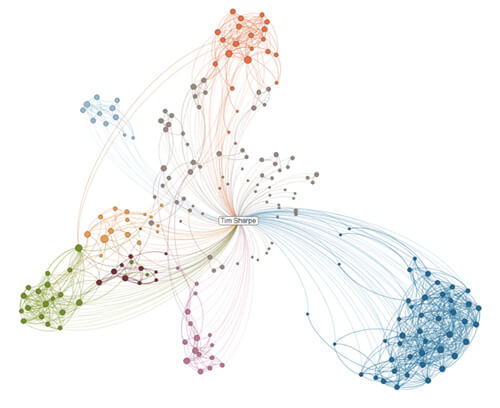I had the opportunity to do a guest post, Problem Solving Through Social Networks in Automation and Manufacturing, over at the Sabisu blog. Sabisu’s Co-founder and CEO/MD Tim Sharpe, shares his thoughts on the importance of social networks for automation professionals in today’s guest post.
It’s 3am in the north of England at the world’s largest ethylene production facility. A lone operator sits in the control room, his sleepy eyes fighting with his Human Factors training telling him this is the most dangerous time of the day.
That’s when the alarms start coming in. The APC algorithms are optimised for rate and quality, driving the furnaces hard and now some of the distillation columns are complaining. The expert on the columns has just retired; his company phone is in the HR filing cabinet. Our operator probably has an hour before he has to trip the plant at a cost of $2m/hr.
Right now, the operator needs good advice. He needs accessible knowledge. If you were to point him to Twitter, Facebook, or even its enterprise equivalent Yammer for help, he’d be pretty angry at you wasting his time when he needs expertise on-call, instantly.
That’s the perception of a lot of our customers; social networks are for kids to share photos of recent misdemeanours, or for marketers to sell shoes. In our risk averse automated manufacturing environment they represent an unwelcome drain on time and resources. These are places for considered actions and detailed procedures; the last place on earth that the organised chaos of social networking has a receptive audience – so much so that Facebook, Twitter, LinkedIn and YouTube are all prohibited at the enterprise firewall.
Yet these social networks are actually incredibly robust and reliable ways of accessing and delivering information. Mark Zuckerberg describes Facebook as ‘elegant organisation’, the implication being that a social network allows you to do something you did anyway, just more efficiently. Whether that social network is limited to the enterprise or not is dependent on you, your business and your data.
We think that a social network can do the following better than any alternative:
- Connect you to expertise. The more connected you are, the more knowledge you have access to. Organising social communities around areas of expertise or business initiatives allows knowledge to be pooled – inside or outside of the enterprise, anywhere in the world. Sharing a community with the right people exposes you to their insights.
- Allow experts to curate for communities. Where enterprise or internet search breaks down, curation steps in; there’s so much data out there that quality content is differentiated by recommendation. An expert guarantee counts for more than a search result page ranking and with multiple experts in your network you soon have access to a vast library of best practice, advice and analysis.
- Kick-start collaboration. Most of the methods of sharing information available today are time consuming and ineffective; email in particular is time consuming, duplicates data and sucks you into manipulating spreadsheets. The exchange of expertise is also buried in the inbox and not available to others who may need it at a later date. Social networks are responsive and immediate, so if you can sign-post to the data, you can collaborate in real-time.
These areas can be summarised in one sentence; social networking is defined by its purpose. Educate your people. Use the right tools.
Back at our ethylene production facility, the operator flips over to his enterprise social networking application, picks out a trend that indicates his issues and shares it with his ‘Ethylene Operations’ community. With a couple of minutes he’s having a video chat with a pair of colleagues in Germany, an insomniac manager in London and an APC consultant in Malaysia.
Ten minutes later, he avoids tripping the plant; the alternative to reduced production rates was much, much worse.

